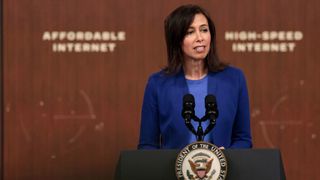FCC to consider huge update to minimum broadband speed
A new required speed of 100 Mbits/sec down would give consumers and small businesses a boost, but could raise prices

Under a new proposal by Federal Communications Commission (FCC) Chairwoman Jessica Rosenworcel, the minimum broadband speeds in America would be raised to 100 Mbits/sec down and 20 Mbits/sec up.
Rosenworcel's Notice of Inquiry raises the issue to her colleagues and will need to be voted on down the line. In 2015, the FCC set the minimum speeds required for an internet service to be considered ‘broadband’ at 25 Mbits/sec down and 3 Mbits/sec up. Internet service providers (ISPs) are currently required to meet these speeds to sell a service as ‘broadband’.
Under Rosenworcel’s predecessor Ajit Pai, the FCC declined to further raise the required speeds. This is despite the increased demand for internet services for working from home and the availability of services such as 4k streaming. Rosenworcel's Notice of Inquiry also proposes a goal of a minimum 1 Gbps/500 Mbits/sec for the future of American internet infrastructure.
If the changes went ahead, ISPs such as Comcast and Verizon might be forced to change pricing to fit the mandated speeds into their packages.
Last year, AT&T executive vice president Joan Marsh criticised proposals to subsidise rollout of fibre to homes and small businesses as unnecessary, stating in a blog post:
“There would be significant additional cost to deploy fiber to virtually every home and small business in the country when at present there is no compelling evidence that those expenditures are justified over the service quality of a 50/10 or 100/20 Mbps product.”
On the likelihood of price increases, Marsh highlighted the “consumer cost challenge” of providing fibre broadband to rural areas at an FCC estimated cost of $100 per month.
Get the ITPro. daily newsletter
Receive our latest news, industry updates, featured resources and more. Sign up today to receive our FREE report on AI cyber crime & security - newly updated for 2024.
“Even the increased Emergency Broadband Fund $50 subsidy will deliver a low-income household less than half of the support it would need to fund such a high-speed service.
“As higher speed networks get deployed to rural America, the current availability challenge could easily become an affordability one.”
A 2021 report by the Government Accountability Office found that current broadband speeds are insufficient to support small businesses, raising the possibility of broadband speed increases to provide support for companies that do not have access to the high speeds enjoyed by larger corporations based in or near major cities.

Your key to digital differentiation and competence
Database services fit for app modernisation, cloud-native innovation, and data-driven strategies
The report further cites data from the National Federation of Independent Business and from Google to highlight that 8% (2 to 3 million) of small businesses in the US lack access to broadband entirely.
The Biden administration reached an agreement with 20 broadband providers in May to improve internet speeds or cut prices of existing broadband packages to improve broadband access. The move comes as part of the wider Internet for All initiative, a $45 billion plan to expand high-speed broadband connectivity currently in the early stages of deployment.
Last year's Rural Digital Opportunity Fund (RDOF) had been earmarked to provide nearly $10 billion to ISPs via reverse auction to expand internet access in rural areas. Shortly into the bidding process, however, the FCC called the legitimacy of some companies into question.
Expanding high-speed broadband to all Americans would also impact the business model of companies such as SpaceX.
Through their service Starlink, the spacecraft manufacturer and satellite communications company currently provides internet access to tens of thousands of customers in the United States, with a specific goal to give those in remote wilderness areas internet at speeds around 50-250 Mbits/sec down.
The consistency of wired internet versus the frequent outages suffered by satellite internet services could drive rural customers away from Starlink if they were offered a viable, high-speed internet package from a traditional provider.

Rory Bathgate is Features and Multimedia Editor at ITPro, overseeing all in-depth content and case studies. He can also be found co-hosting the ITPro Podcast with Jane McCallion, swapping a keyboard for a microphone to discuss the latest learnings with thought leaders from across the tech sector.
In his free time, Rory enjoys photography, video editing, and good science fiction. After graduating from the University of Kent with a BA in English and American Literature, Rory undertook an MA in Eighteenth-Century Studies at King’s College London. He joined ITPro in 2022 as a graduate, following four years in student journalism. You can contact Rory at rory.bathgate@futurenet.com or on LinkedIn.




